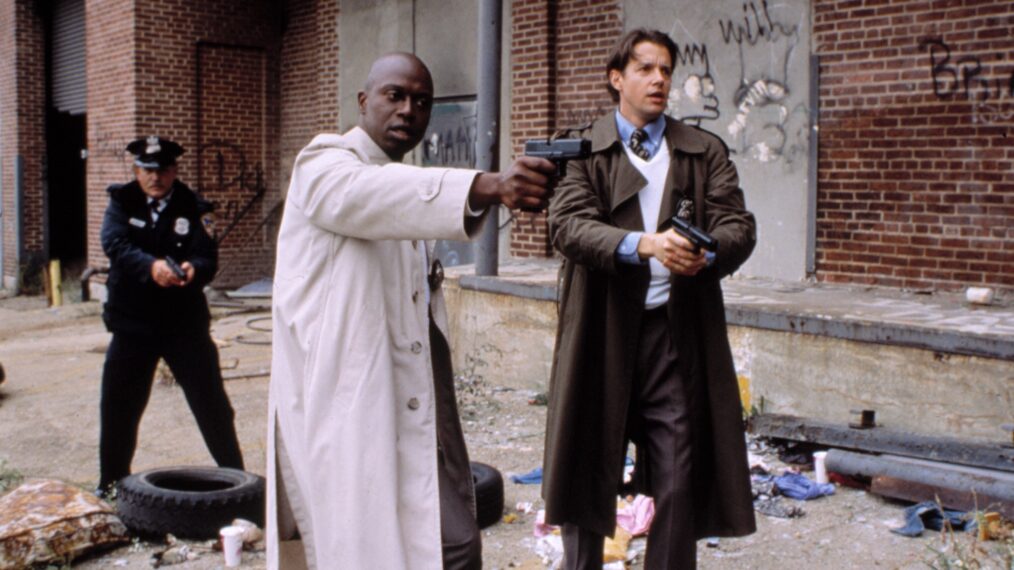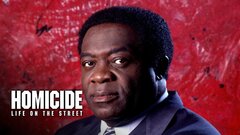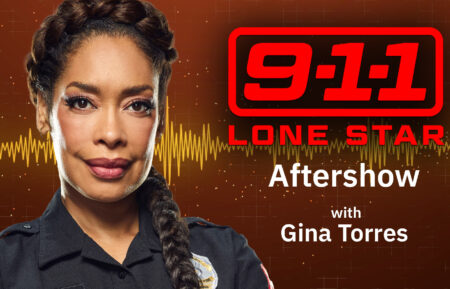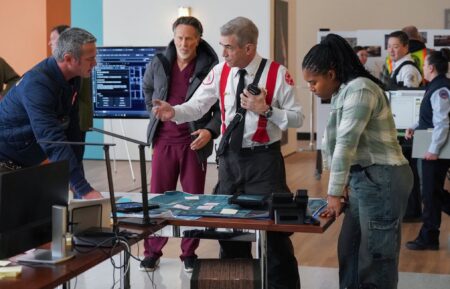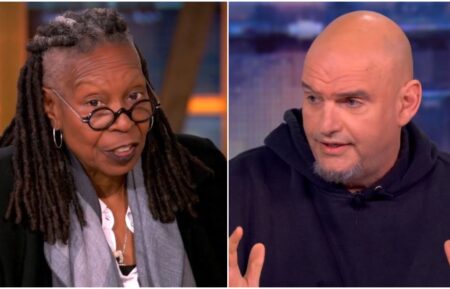Tom Fontana on ‘Homicide’s Influence on Other Shows & Which Episodes Aren’t Streaming on Peacock
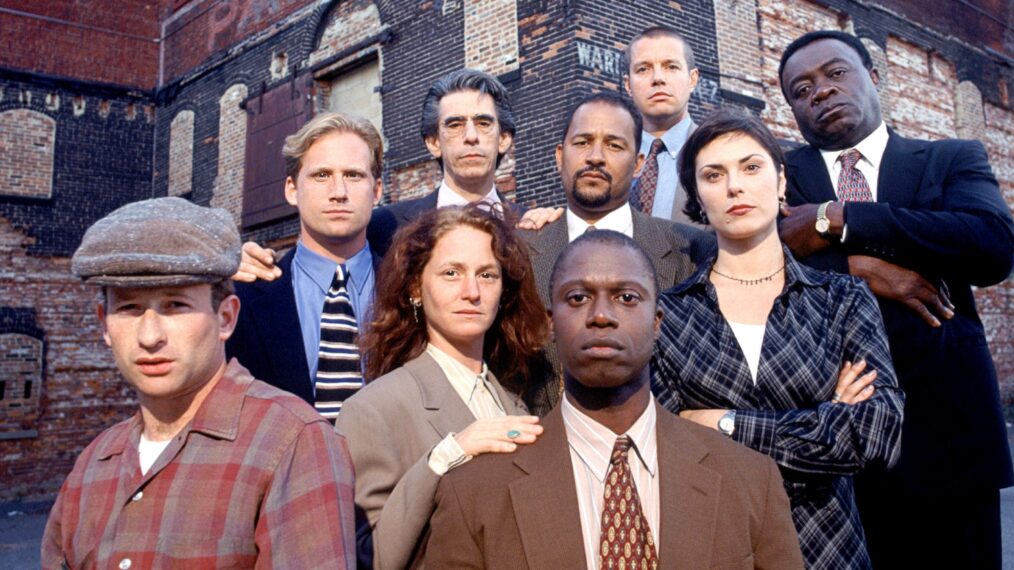
Q&A
Despite not ever garnering huge ratings on NBC, the critically acclaimed Baltimore-set police show Homicide: Life on the Streets won a number of awards, including several Emmys in its unexpected seven-season run (1993-1999). Created by Paul Attanasio and based on David Simon’s nonfiction book Homicide: A Year on the Killing Street, the show was innovative, beautifully cast appointment television that has had a profound influence on many fine shows that followed.
And yet, though it was occasionally syndicated back in the day, Homicide was never available on streaming for fervent fans to rewatch and a new audience looking for fine fare to watch for the first time. That is until now when Peacock finally made it available for a new audience.
TV Insider talked to executive producer Tom Fontana (St. Elsewhere, Oz), who doesn’t watch his shows after the final edit), about his memories of the show, why it is considered a gem, and why it stands up today.
You and your producing partner Barry Levinson have been trying to get Homicide on a streaming service for years. What was the holdup?
Tom Fontana: Part of it was renegotiating the music rights: Most of the music remains. The other part was remastering the show because we all want the show to look its best. And given that we shot it on 16mm many years ago, and audiences—especially new audiences—are used to seeing top-quality film, HD and 4K will be an important ingredient without compromising the look of the show, which was very specific. It doesn’t look like it just came through an AI remix. [Laughs] The faces are real, the eyes are real. It’s good.
Though critics loved Homicide, why do you think it didn’t break through to a bigger audience? TV Guide Magazine had called it The Best Show You’re Not Watching. Was it because cases were not always saved or there was a lot of talking and fewer shoot-outs?
I would say it was atypical of a cop show, which was the goal. Back then and to this day, the Baltimore homicide unit was made of thinking cops. So we didn’t want to do car chases or gun battles, the stuff that propels people into commercials. We did have a very loyal, if small, audience. The reason I believe that NBC kept us on the air was we also had a higher income audience and so they could sell advertising that they couldn’t on other shows like expensive cars.

NBC / Everett Collection
The show did run for seven seasons, which would make it pretty successful today.
Speaking of today, what’s funny is given where viewerships are these days, if Homicide was getting the numbers it got back then now, it would be considered a hit show. I truly believe that, and maybe I’m deluding myself, but I believe that on Peacock, which has a solid audience, people who have never seen the show, will respond to it. Unfortunately, the crime stories we were telling then are still relevant now. If an audience wants to see something that they haven’t seen before, I think they’ll embrace the show because the storytelling is very unique in that we’d tell story based on the character as opposed to the plot. We were more interested in following our regular characters and the guest actors through the journey caused by a murder or two, or three depending on the episode.
Your cast was excellent and most went on to solid careers, but Andre Braugher, who sadly died too young recently, was a break-out as Det. Frank Pembleton whose interrogation scenes could be pulse-pounding. Were you aware from the beginning how brilliantly Braugher did those scenes? Did you always want to focus on interrogations?
Those scenes were powerful. I remember sitting with Barry, as he directed the first episode, and Andre and Kyle Secor [Det. Tim Bayliss] were interrogating a young street husband who had killed a “john” in a motel room, and the rhythm they fell into was magical. That’s when I decided I’d write “Three Men and Adena,” which was almost completely in the interrogation room. Barry agreed that we could do a whole hour of just three people in a room discussing the murder of a child. They were dealing with something important. That goes back to why I think the show will hold up, because nobody was doing that kind of storytelling back then. And I’m not sure who’s doing it now.
Critics have called Homicide an influential show over the years. What would you say about that and can you talk about some of the shows it may have influenced?
It’s hard to be specific, but for example, the camera work that Barry came up with had a major influence on dramas because people weren’t stuck with the camera being in one place. It could have a fluidity that nobody had seen before. Maybe this is a reach, but I think we may have cracked the door on the blurry line between heroes and villains that later became Oz and The Sopranos, The Wire and Breaking Bad. We were very conscious not to make judgments about any of the characters, either our regulars or the murderers and victims. We wanted the audience to make it their choice about who they believed and who they didn’t believe.
It was a pretty perfect time because the ’90s really started the anti-hero trend. Of course your cast was superb, as you’ve indicated. Did they connect right away?
Every actor comes at their character at a different pace. Andre was absolutely on his game day one. I would also say [Richard] Belzer [who played Det. Munch, whom he reiterated many times on the Law & Order franchise]. Belzer was just doing his thing and it was fabulous. Kyle Secor, as I said, once he and Andre got into that room, he instantly found the rhythm [of his character] and Melissa Leo [Det. Kay Howard] who knew her character wonderfully right from the get-go.
Though there are many wonderful, insightful episodes, can you name a few of the most meaningful to you, besides the superb “Three Men and Adena”?
“Subway,” with Vincent D’Onofrio [as a dying man stuck under a train]. It was memorable. And then “Doll’s Eyes.” I got home one night and turned on the TV and there was the episode with Marcia Gay Harden. That particular episode, which was written by Jim Yoshimura, was such a touching, beautiful story about parenthood and compassion that I made the mistake of going that I’d watch five minutes—I rarely cry, but by the end, I was a puddle of tears! I called Jim at like 11 pm and I said “You bastard!” and hung up. It’s hard for me to say “Adena,” because I won the Emmy for that and it would sound like bragging.
Some viewers were angry that over the show’s many years that case was never solved. Why?
I made a conscious choice because the real murder of the real girl in Baltimore was never solved. And I thought it would be disrespectful to her and to her family for us to come up with some kind of fictional solution to the problem. And we focused on the fact that Bayless could not let it go, which was true of the real detective on the case. I can understand it, the unsatisfying for people, but it is more truthful.
Are there any episodes that won’t be on Peacock? And will the infamous out-of-order episode be righted?
I’ve heard that they won’t run the Law & Order episodes of the crossovers. For those who don’t remember, what happened with the out-of-order episode, was that we decided to kill the character of Crosetti [Jon Polito]. It was a suicide and the episode happened to fall during sweeps week. [NBC Entertainment chief] Warren Littlefield was concerned that it wasn’t our happiest episode and that it would further alienate the people they were trying to bring to the show. And so they showed the episode that would have aired after that one; the problem was that the characters referred to Crosetti’s death but we hadn’t killed him. And the next week, the episode aired where he died!
If Homicide does well on Peacock, could you and Barry Levinson consider some kind of reboot or spinoff?
I don’t like to think about those things, nor do I have to think about them, but Barry and Gail Rex, one of our producers, and Jimmy Yoshimura and I have broached the subject. We have not landed anywhere. The hard part is that the show, as you say, is iconic. And I think we’d have to be very careful not to be haunted by the original series. And I think that’s probably the problem with a lot of reboots is that people try to copy what came before. It’s a long time ago that Homicide was written. And so I think any new version of the show would have to be as sharp and as compelling as the old show, but with a real contemporary sensibility.
Looking forward to that if you decide to go for it. By that way, your most recent show, AMC’s Monsieur Spade with Clive Owen as Sam Spade, was terrific. Is that returning?
That’s a good question. You’d have to ask AMC’s Dan McDermott. We are having conversations but they’re moving at a glacial pace.
Homicide: Life on the Street, Streaming now, Peacock
From TV Guide Magazine
What to Expect From 'The Hunting Party's Love Triangle and Mystery
Manifest alum Melissa Roxburgh and the showrunner of NBC’s Hunting Party tease TV Guide Magazine about what’s ahead for the “government conspiracy that just keeps unfolding” — plus, the series’ “good” love triangle. Read the story now on TV Insider.

